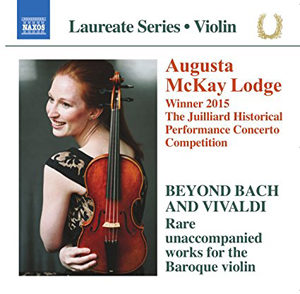In the old days when people used to go to a record store, buy a recording, then take it home and have a couple of friends over to listen, sometimes they might play a little game: try to identify the composer/artist/music. This disc of baroque works for violin solo would have made a good subject for the challenge. More knowledgeable listeners wouldn’t have guessed Bach or Vivaldi, or even Telemann as composers; but neither would they have been likely to suggest Matteis, or Baltzar, or Nogueira. Nor would they have chosen Augusta McKay Lodge as performer–the 25-year-old virtuoso, 2015 winner of the Juilliard Historical Performance Concerto Competition (who knew there was such a thing?) is just now making her mark on the world stage, a world where the once-obligatory in-store record signing appearance has been replaced–thanks to the disappearance of said stores–by websites, email lists, and digital downloads.
One thing hasn’t changed, and has little to do with age or even the name of the composer or composition, and that is great violin playing, which Lodge delivers consistently, carefully, and confidently throughout this 68-minute program. Pieces such as these assume a certain level of advanced technique, which comes with the territory for many of today’s well-schooled, formidably well-practiced young string players. However, what sets a handful of performers apart from those who merely use these kinds of works as novelty pieces to show off their “formidable” technique comes down to details such as tonal variation, articulation, and phrasing–anyone who plays at a certain level can play the notes, but it’s artists like Lodge who make the music sing and dance and sometimes really engage on a deeper interpretive level–where we listen more closely and hear the mysterious transformation of a single line into multiple parts, fleshed out harmonies, and sophisticated developmental features, articulate, assertive, seductive, lovely, elegant.
Few listeners will have heard of Bach contemporary Nicola Matteis–he is rarely, or barely, mentioned in the common music dictionaries–but his music as presented here is engaging, highly accomplished, and, yes, sophisticated enough to remind us once again of the old “what if”–that is, if Bach hadn’t existed, the solo violin works of a composer such as Matteis today would very likely hold a favored place in the standard repertoire. The structural and developmental elements that define Bach’s solo violin works are here as well, as in the gradual heightening of tension and harmonic complexity through the substantial, remarkable C minor Fantasia. Lodge certainly makes the case, as she does with the music of another “obscure” composer, 18th-century Portuguese violinist Pedro Lopes Nogueira. Lodge offers only two relatively short examples of his work, but they have the effect of making us want to hear more.
While the set of four short pieces by Thomas Baltzar are interesting enough, they are more like challenging exercises than true concert works. Alternatively, the Pisendel and Biber selections, anything but “rare” (listen to Rachel Barton Pine’s own commanding performances on Cedille–and read our review–for a useful comparison), are significant and substantial masterpieces of the solo violin genre, the former, although very different in style, holding its own alongside Bach’s monumental creations, and given vibrant, articulate voice by Lodge’s artful interpretive imagination and skillful bow. The oft-recorded Biber Passacaglia makes a compelling climax to a very satisfying recital.
































